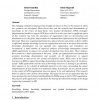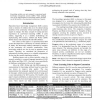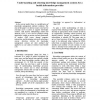112
click to vote
ECIS
2003
15 years 4 months ago
2003
The changing competitive landscape has brought new forces to bear on the manner in which new products are developed. These forces have put the creation and dissemination of knowle...
111
click to vote
ECIS
2001
15 years 4 months ago
2001
We are not only in a new millennium but also a new era. A variety of terms such as the Post-Industrial Era (Huber, 1990), the Information Age (Shapiro et al, 1999), the Third Wave...
113
click to vote
ECIS
2001
15 years 4 months ago
2001
This paper argues for a return to fundamentals as we enter the new millennium. It argues that the field of Information Systems should no longer be distracted from its natural locu...
120
click to vote
CAISE
2008
Springer
15 years 4 months ago
2008
Springer
The definition of Information System do not consider individual as a component of the Information System. In this paper we present our postulates, and our definition of Knowledge M...
117
click to vote
FLAIRS
2007
15 years 5 months ago
2007
Knowledge artifacts are units retained in repository-based knowledge management systems (KMS). When adopting cases as the representation for knowledge artifacts in KMS, one of the...
131
click to vote
HICSS
2002
IEEE
15 years 7 months ago
2002
IEEE
In the current market there is a proliferation of knowledge management software solutions. The aim of this paper is to discuss issues concerned in selecting such a system to suppo...
145
click to vote
AMKM
2003
Springer
15 years 8 months ago
2003
Springer
Abstract. Distributed knowledge management systems (DKMS) have been suggested to meet the requirements of today’s knowledge management. Peer-to-peer systems offer technical found...
GROUP
2003
ACM
15 years 8 months ago
2003
ACM
Most of the available knowledge management systems pay little attention to two important aspects: the need of supporting emerging communities of interest together with the officia...
103
click to vote
HICSS
2003
IEEE
15 years 8 months ago
2003
IEEE
Knowledge Management Systems (KMS) play increasingly important roles in organizations due to the realization of the value of knowledge and capabilities of computerized systems to ...
113
click to vote
HICSS
2006
IEEE
15 years 9 months ago
2006
IEEE
Knowledge management (KM) has been an increasing focus for both researchers and practitioners for more than a decade. The discussions generally have viewed the goal of KM as the a...



